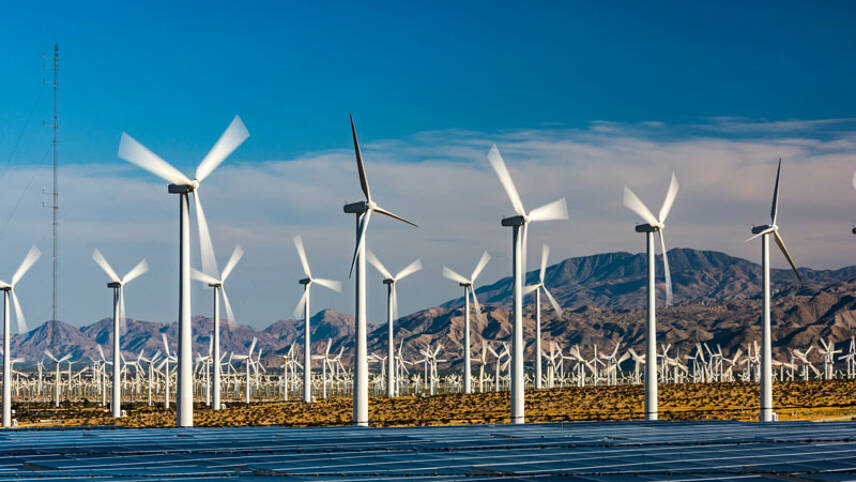Register for free and continue reading
Join our growing army of changemakers and get unlimited access to our premium content

The US emerged as one of the top markets for new wind energy installations.
That is the warning from trade body EnergyUK, which represents businesses collectively responsible for some 80% of the UK’s power generation.
EnergyUK has this week produced a new analysis with Oxford Economics comparing the pace of the energy transition in the world’s eight largest economies. The analysis also looks at how the transition is likely to take shape for the rest of the decade, based on existing funding commitments from national Governments.
The findings are damning in terms of likely near-term investment in low-carbon electricity generation in the UK. EnergyUK is predicting a 10.6% average annual growth in low-carbon electricity output in India through 2030, with the figure standing at 7.2% for China and 6.4% for the US.
The UK, meanwhile, lags at the bottom of the eight nations. EnergyUK’s forecast for average annual growth in low-carbon electricity output in Britain for the rest of the decade is just 2.9%.
This may change when the UK puts forward its own response to multi-billion-dollar clean energy subsidy packages launched in the US and EU, which it is due to do later this year at the Autumn Budget.
EnergyUK, like several other key trade bodies and think tanks already have done, is urging Chancellor Jeremy Hunt to prepare a UK approach that matches the scale of increasing global competition – in terms of funding level, strategic approach and breadth of technologies covered.
The body acknowledges that the UK cannot outspend the US’s $369bn for climate in the Inflation Reduction Act (IRA). However, it notes that the UK has other strengths and, even with a smaller funding package, could benefit from a clearer and more modern approach to growing clean energy industries.
Noted in the report is the fact that the UK only ranks 30th out of the 38 OECD nations in terms of the proportion of capital investments in clean energy that businesses are able to recover. Issues arise not only from public spending levels, but plans to leverage private sector investment.
EnergyUK chief executive Emma Pinchbeck said: “The UK’s world-leading role in the development of clean energy has given us strengths in terms of expertise and experience – but we have no divine right to this position.
“With growing global competition for private investment that can choose its location, a failure to respond will quickly see us fall behind and jeopardise ambitious targets for increasing our own sources of clean energy and decarbonising our whole economy.”
In addition to the US IRA, the paper covers the EU’s Green Deal Industrial Plan; China’s $564bn spend on clean technologies in 2022; Japan’s $18bn Green Innovation Fund and India’s $4.3bn clean energy investment plan for the next financial year.
Ministers are aiming for the UK to end unabated fossil-fuelled electricity generation by 2035. They have repeatedly been pressed by trade bodies, analysts and policymakers to prepare a clearer pathway to delivering this milestone – which is considered crucial in the transition to a legally binding 2050 net-zero target.
EV leadership (for now)
As well as looking at low-carbon electricity, the paper looks at other key cleantech sectors. There is one where the UK remains a global leader and is set to do so through to 2030 – the electrification of cars and vans.
EnergyUK has revealed that the UK is the only one of the world’s eight largest economies to manufacture more pure-electric and hybrid light vehicles than traditional petrol and diesel models. As eight out of ten cars manufactured in the UK are exported, this sends a strong signal to other nations.
The UK has a smaller car manufacturing capacity than all of the other eight nations considered, except India. The largest manufacturer by far is China, followed by Germany and the US.
There is a warning that the UK is not guaranteed to retain its leadership position in terms of electric vehicle (EV) manufacturing. The US is proving a particularly attractive market for the near term and medium term; automotive and battery players in the US have announced 20 times more funding since the IRA passed a year ago than they did in the year before its launch.
The EnergyUK report states: “The automotive sector is an area where the UK has relative strengths, but these need to be capitalised on to make a success out of the transition.
“Although the UK has made a good start on transitioning to a net-zero economy, it risks falling behind other countries in years to come”


Let us not loose sight of the fact that “electric cars” derive their power in the first place from the Grid.
A major source of grid power is natural gas. Carbon.
Natural sources, wind water and solar are variable, out of our control, and thus not completely dependable.
Power is not just a question of “switching on”!!! It is, in fact, quite complex!!
I seem so often to be a lone commentator on articles in edie.
Is a 92 year-old scientist from the UKAEA the one of the few with the time to tap on the keyboard!!!???